
Blepharitis is a common and often chronic condition characterized by inflammation of the eyelids. It can lead to symptoms such as redness, swelling, itching, crusting around the lashes, and a gritty or burning sensation in the eyes. Many patients with blepharitis also experience dry eye syndrome, as the inflammation interferes with the glands that produce essential components of the tear film.
While blepharitis can stem from bacterial overgrowth, skin conditions like rosacea or dandruff, and dysfunction of the meibomian glands, emerging research shows that diet and lifestyle factors also play a significant role in both the development and severity of the condition.
The Link Between Diet, Inflammation, and Blepharitis
What you eat directly affects your body’s inflammatory response. Diets high in processed foods, sugars, and unhealthy fats can increase systemic inflammation, potentially worsening inflammatory eye conditions like blepharitis. On the other hand, diets rich in anti-inflammatory foods (such as leafy greens, fatty fish, nuts, and seeds) can help reduce symptoms and support ocular surface health.
Key nutrients like omega-3 fatty acids have been shown to improve the quality of the meibomian gland secretions, essential for maintaining a stable tear film and preventing dry eyes. Omega-3s can be obtained from sources like salmon, flaxseed, and high-quality fish oil supplements.
Lifestyle Factors That Can Worsen or Relieve Blepharitis
Several lifestyle habits can influence the development or worsening of blepharitis:
Poor eyelid hygiene can lead to bacterial buildup along the lash line.
Screen time and reduced blinking can exacerbate dry eye symptoms.
Environmental irritants, such as smoke and air pollution, may increase eyelid inflammation.
Lack of sleep and chronic stress can affect immune function, making the body more susceptible to inflammation.
Incorporating regular eyelid cleansing routines, managing screen time, and maintaining a clean, humidified environment can all support better eyelid and eye health.
Targeted Treatment Makes a Difference
At The Center for Eye Care and Optical, we combine advanced treatment options with nutritional counseling and therapeutic-grade supplements to help address the root causes of inflammation and dry eye.
In-office procedures may include deep eyelid cleaning for meibomian gland dysfunction, and prescription medications when necessary. We also recommend physician-grade omega-3 supplements to support the tear film and reduce inflammation from within.
Take Control of Your Eye Health at The Center for Eye Care and Optical
Blepharitis and dry eye are multifactorial conditions, and diet and lifestyle play a crucial role in their development and progression. With the right combination of professional care, lifestyle modifications, and nutritional support, patients can experience significant relief and better long-term eye health.
If you’re struggling with symptoms of blepharitis and dry eye, schedule a consultation at The Center for Eye Care and Optical to find lasting relief through advanced, personalized treatment. Visit our office in West Islip, New York, or call (631) 825-7725 to book an appointment today.











